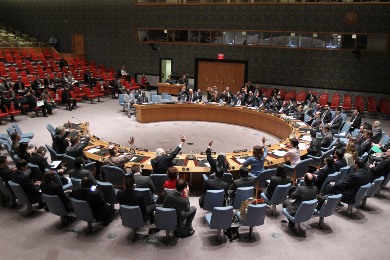UN Security Council renews sanctions against those blocking peace in South Sudan
April 7, 2016 (NEW YORK) – The United Nations Security Council Thursday renewed, until 1 June, its sanctions regime imposed last year against those blocking peace in the war-torn country, including a travel ban and a freeze on their assets.

In a separate action, the Council issued a UN presidential statement welcoming progress so far made on steps outlined in the implementation of South Sudan’s peace agreement signed in August 2015. These include implementation of the Juba security arrangements and the return of some members of the Sudan People’s Liberation Army in Opposition (SPLA-IO) to the capital, Juba.
The Council, however, expressed regret that some of its earlier calls had not been fully met, and strongly urged all parties to implement fully the Agreement on the Resolution of the Conflict in the Republic of South Sudan.
Last month, Security Council expressed its intention to assess by 30 April the progress so far made in steps being taken by South Sudan’s warring parties as outlined by the Council in its 17 March presidential statement, which related to the implementation of the August 2015 peace agreement and a proposal for a national boundary commission to review the number of states in South Sudan and their boundaries, among other issues.
The Council earlier backed a communiqué by the East African regional bloc (IGAD), which called for suspension of 28 states unilaterally created by President Salva Kiir and called on the parties to the conflict to determine the number of states or revert to the 10.
The United States, the penholder on South Sudan, had circulated the original draft of the resolution on 4 April, to extend the sanctions the regime, together with the draft presidential statement. The adoption of the sanctions resolution had originally been scheduled for 13 April, but as a short technical roll-over draft of three operative paragraphs, it does not appear that negotiations were required.
Also, a significant issue of discussion among members in recent months has been whether the Council should pursue an arms embargo. This was a recommendation made by both the South Sudan Sanctions Committee’s Panel of Experts in its January final report and by the Office of the High Commissioner for Human Rights in its March report into allegations of violations and abuses of human rights and international humanitarian law in South Sudan.
Meanwhile, several of the Security Council members continue to support an arms embargo. However, others, including some veto-wielding permanent members and some elected members, are not supportive of this course of action, particularly at what they believe is a critical juncture in the implementation of the August 2015 peace agreement.
The recent arrival in Juba of the first wave of 1,370 forces of the armed opposition faction of the Sudan People’s Liberation Movement (SPLM-IO) has also encouraged the Security Council’s members, as the full arrival of these troops is expected to pave the way for the return of opposition leader, Riek Machar, and thus lead to the formation of the long-delayed transitional government of national unity.
Other Council members were, however, less optimistic about this development, given the slow implementation of the peace agreement and the continued violations of the ceasefire in Equatoria and Bahr el Ghazal regions. However, it appears the perception that some progress has been made muted calls by these members for additional sanctions, whether targeted measures (i.e. assets freezes or travel bans) or an arms embargo.
Edmund Yakani, a South Sudanese activist, insists the international community was losing its patience on political leaders involved in South Sudan’s unending conflict.
“The golden option of avoiding the sanctions extension is 100% in the hands of the political leaders,” Yakani, the executive director of Community Empowerment for Progess Organisation (CEPO) told Sudan Tribune Friday in reaction to the sanctions renewal.
“The political leaders of the primary parties to the peace agreement have the option of avoiding that by immediate formation of the transitional government of national unity and addressing some of the issues that are associated with the questions of IGAD communique on the issues of the 28 states,” he stressed.
(ST)
